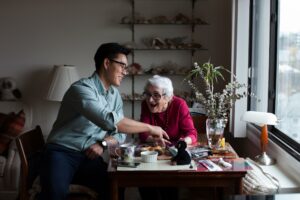By April McQueen, Contributing Writer

Photo by Rachael Cerrotti provided courtesy of FriendshipWorks.
BOSTON – At the height of the COVID-19 pandemic, people of all ages suffered from isolation because of lockdown restrictions, but the older adult population was affected perhaps more than any other group.
“Social isolation comes from not having someone who connects with you on a regular basis,” said Janet Seckel-Cerrotti, the executive director of FriendshipWorks, a Boston-based non-profit. “For older adults it depends a lot on their health in terms of connection. It’s harder to make new connections later in life. They have a lot more losses than gains.”
Seckel-Cerrotti shared what she believes are three basic things that she feels are important and necessary to avoid being socially isolated but are not always easy to attain. First and foremost, “Everybody would have a friend, and nobody would be alone unless they choose to be,” she stated. Second, “That everybody has some interdependence–someone to call to help out with the small things.” Finally, that “Everybody has someone to talk to as part of a meaningful relationship.”
A long history of helping older adults

Photo by Meri Bond provided courtesy of FriendshipWorks
Seckel-Cerrotti has been with FriendshipWorks since 1984, when the agency began, and became executive director in 1991. Its mission is to reduce isolation, enhance the quality of life, and preserve the dignity of older adults in the Greater Boston area, including Boston, Brookline, Newton, Somerville, and Cambridge. It accomplishes this by recruiting, training, and matching volunteers of all backgrounds with older adults for friendship and support.
“One of the most important factors for how people coped during the pandemic was what their level of activity and physical connection with others was before the pandemic,” according to Seckel-Cerrotti. “We are trying to reach people most at risk of isolation and loneliness.” She noted that other factors that influence this include health, losses, networks of friends and family members, living situation –alone, or with others they love and care about– and connections to services.
Adapting to the times
During the worst parts of the pandemic, before vaccines were available, in-person visits between volunteers and older adults typically weren’t possible. FriendshipWorks sought to provide continuity of connection through adapted programs that included frequent phone calls, handmade cards, letters, FaceTime video calls, group learning on Zoom, and other methods.
“Technology has a lot more to do with income than age,” Seckel-Cerrotti noted. “Where you live in terms of accessibility, and then the cost of adding another bill,” are factors in technology being used by older adults, she explained. “We were very sensitive to the fact that many older adults we serve did not have technology, so reaching out through phone calls, print newsletters, and cards and letters was essential to alleviating loneliness during an unprecedented time.”
The “magic of the match”
Seckel-Cerrotti attributes the success of her organization’s services to what she calls “the magic of the match.” FriendshipWorks asks for an eight-to-ten-month commitment from the volunteer who is matched with an older adult. “Only one time did someone say he had ‘finished his commitment’ and then quit early,” said Seckel-Cerrotti. “There is a sense of obligation and responsibility. It’s one-on-one and our matches last.”
Older adults are bouncing back, according to Seckel-Cerrotti, based on the high number of recent referrals for people to participate in the organization’s programs. So what’s the secret to the program’s longevity of volunteer commitment and service to the older adult population? “The volunteers are making a difference in some way,” she said. “There is a stigma to being lonely or isolated. Volunteering starts out by connecting based on interest; and then you are interested in people’s lives; and next you are sharing in them.” For both the volunteer and the older adult receiving the visit, “It is something to look forward to each week,” she concluded.
For more information about FriendshipWorks, visit https://www.fw4elders.org/.
RELATED CONTENT:
Shining the light on caretakers Shining the light on caretakers (fiftyplusadvocate.com)
Hearing loss intervention can be life changing for older adults (fiftyplusadvocate.com)
Edith Bazile – An advocate for the invisible, dismissed and devalued (fiftyplusadvocate.com)












